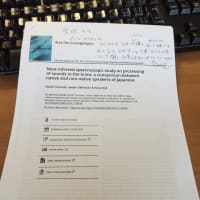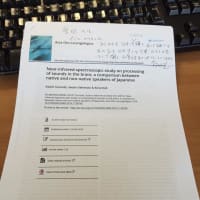原田武夫です。さらにおまけで一つ。
一応、City of Londonが現状、どのようにギリシア勢による「ユーロなんて抜けてやる!」攻撃について考えているかを転載しておきます。ご参考まで。まぁ、2月28日、ですな。。。
・・・
> the omfif commentary
>A BRIEFING ON THE STORIES BEHIND THE WORLD'S ECONOMIC NEWS
>
>Mon 9 Feb 2015 Vol.6 Ed.7.1
>
>
>
> Contingency plans for Greek euro exit
>
> An experiment no one wants would test the fire-walls
> By David Marsh
>One reason for a certain equanimity in Europe’s political capitals about a possible Greek euro exit is that, during the past three years, Europe has constructed significant fire-walls separating the Greeks from the rest of the single currency bloc. The day is fast approaching when Europe may examine how strong they are. No one wishes to test a fire-wall by starting a fire, but that is what may happen.
>The logical extension of the confrontation between Greece and its creditors is that Alexis Tsipras, the new Greek prime minister, will get ready to break from the euro, perhaps by issuing a parallel domestic currency (or stamping current euro banknotes with a Greek emblem).
>Whether or not the threat will be carried out is anyone’s guess. The whole point about brinkmanship is that it takes us to the brink. Neither the new decision-makers in Athens nor the leaders of economic and monetary union seem at present in the mood to compromise.
>So financial markets and politicians should consider that the atmosphere may get a lot worse before it gets better. This means that central banks, financial organisations and treasuries all over the world should have contingency plans in preparation for Greece to leave the single currency which it has done so much to complicate and so little to invigorate since it joined in 2001.
>One of the reasons why policy-makers on both sides are digging in is because the issues are so complex and intertwined that resolution is well-nigh impossible. Whatever theoretical agreements seem possible are bedeviled by fresh dilemmas. So politicians have little incentive for compromise and instead seek refuge in established positions.
>If Tsipras backed down and agreed to extend the international bail-out programme beyond the 28 February deadline, that would give comfort to leading creditors. It would hearten hard-pressed governments in Spain, Portugal and Italy which fear domestic adversaries will gain political ground from any softening of Greek conditions – and then seek similar concessions in their own countries.
>Yet a continuation of Greek austerity, when Yanis Varoufakis, the finance minister, has admitted to all and sundry that Greece is bankrupt, would not increase Greece’s long-term ability to repay the €320bn public sector debt mountain. Over 80% of this is owed to different portions of the troika of the IMF, European Central Bank and EU governments.
>Whatever scenario is played out, and assuming the euro area continues to record a slightly faster but still rather sluggish recovery, voter impatience with established EMU governments will continue to rise. Geopolitical tensions over Ukraine, and the possibility that Russia will make mischief in southeast Europe and the Middle East by playing the Greek card, will make the position exceptionally volatile.
>For the time being, flames will be fanned by Tsipras’ defiant speech to the Athens parliament on Sunday night and Varoufakis’ provocative interview with Italian TV in which he called the euro bloc a ‘house of cards’ that could collapse.
>One reason why the Greek government has a few bargaining cards is that some suspect that Varoufakis’ statement about EMU fragility may be right. A good way of proving that his assessment is incorrect would indeed be to carry out a real-life experiment by watching what happens to Greece if it introduced a parallel currency, and then coming to a new judgment.
>No one of any importance wishes the euro adventure to turn into this kind of experiment. Many will try to prevent it happening. Yet that could be the way we are heading.
>
>Further information
>All developments regarding OMFIF can be followed at www.omfif.org and www.twitter.com/OMFIF.
>For further information contact editorial@omfif.org or Sophie Lewisohn on +44 (0) 20 7965 4510.
>
> Global Public Investor 2015
>OMFIF is producing the next edition of the Global Public Investor (GPI), a comprehensive publication devoted to public-sector asset ownership and management across official institutions around the world, including central banks, sovereign wealth funds and a multiplicity of other public asset funds, especially in the pension sector.
>
>GPI 2015 goes into greater detail on big investment themes by providing macroeconomic data on countries’ net foreign investment positions and the proportions held by official institutions in each case.
https://www.facebook.com/iisia.jp/posts/819853214752568




















※コメント投稿者のブログIDはブログ作成者のみに通知されます